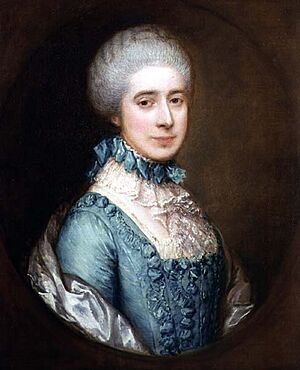Thomas Coote (Irish politician) facts for kids
Thomas Coote (born around 1655 – died 24 April 1741) was an important Irish politician and judge. He served in the Irish House of Commons, which was like the parliament of Ireland back then. He also held important jobs such as Recorder of Dublin (a top legal officer for the city) and a judge in the Court of King's Bench (Ireland), which was a high court. Even though many people liked and respected him, he was removed from his judge position in 1714. After that, he went back to being a politician. He was the grandfather of a famous person called the Earl of Bellomont and loved collecting books.
Contents
Early Life and Education
Thomas Coote was the third son of Richard Coote, who was the first Baron Coote of Colooney. His mother was Mary St. George. His older brother, Richard Coote, 1st Earl of Bellomont, was a well-known governor of New York and Massachusetts. Thomas was much younger than Richard.
Thomas Coote inherited land from his uncle, who was also named Thomas Coote, in Cootehill, County Cavan. He decided to become a lawyer. In 1683, he joined a famous law school in London called Middle Temple. He returned to Ireland in 1684 to start his legal career and joined another law group called the King's Inns that same year.
Becoming a Judge
Thomas Coote strongly supported the Glorious Revolution, a big change in how England was ruled. When King James II came to Ireland in 1689, Thomas lost his property for a time because he was against the King. He moved to England, but after King James II's power ended at the Battle of the Boyne in 1690, Thomas returned to Ireland.
Later that year, he became the Recorder of Dublin. In 1692, he joined the Irish Parliament as a representative for Dublin. In 1693, he was appointed as a judge to the Court of King's Bench. He also served as a Commissioner of the Great Seal of Ireland in 1697, which meant he helped manage important government documents.
A Notable Court Case
In 1701, Thomas Coote was the judge in a well-known case involving a law student named Patrick Hurley. Hurley was accused of trying to trick the government into giving him money by claiming highwaymen had stolen from him. The case was very important at the time, even though Hurley wasn't a rich or famous person.
Judge Coote handled the trial by himself, which was unusual for a criminal case back then. Trials had to finish in one day, so he worked very hard, questioning all the witnesses. Records show he was a very active and fair judge. Hurley was found guilty, but his punishment (a fine or imprisonment) was not too harsh for the time.
Later Life and Career
When Queen Anne died, many Irish judges, including Thomas Coote, were removed from their jobs because of their political views. However, this was only a temporary setback for most of them. Thomas Coote was very popular, and people trusted his loyalty to the new royal family. A writer named John Dunton even said he was "a man who was universally loved."
Thomas Coote returned to Parliament in 1723, representing County Monaghan. He lost his seat in 1727 but won it back in 1733. He passed away in Cootehill in 1741, at about 86 years old.
Family and Descendants
Thomas Coote was married three times.
- His first wife was Frances Copley. They had a son named Chidley, who sadly died before his father and did not marry.
- His second wife was Eleanor St George. They had a son named Thomas, who also died young, and a daughter named Mary.
- His third wife was Anne Lovett. They had nine children, and at least five of them lived to adulthood: Charles, Francis, Elizabeth, Catherine, and Anne.
His son Charles became the father of Charles Coote, 1st Earl of Bellomont, a very important figure. Through his daughter Catherine, Thomas Coote was also an ancestor of the poet Frances Greville and the well-known political hostess Frances Anne Crewe. His daughter Elizabeth married Mervyn Pratt, a Member of Parliament, and they had children. The Pratt family owned Cabra Castle until 1950.
Character and Interests
Thomas Coote was a well-liked and respected person. He was known for being very religious, kind, and for his great love of books. As a politician, he was very interested in helping the linen trade grow in Ireland. He even wrote a book about how to grow flax and hemp, which are plants used to make linen.
 | Sharif Bey |
 | Hale Woodruff |
 | Richmond Barthé |
 | Purvis Young |


